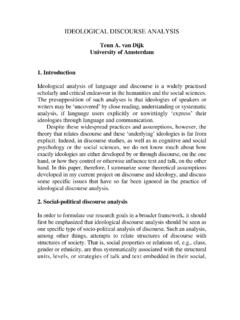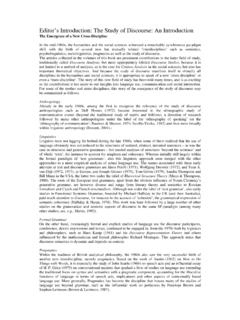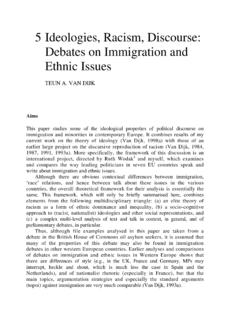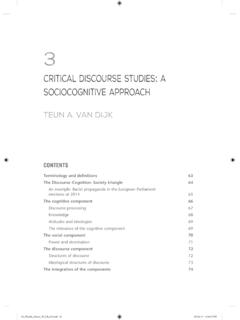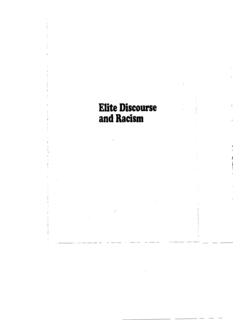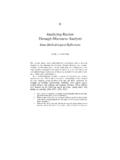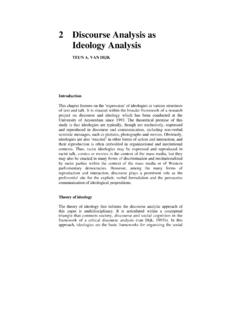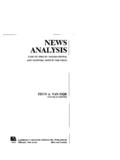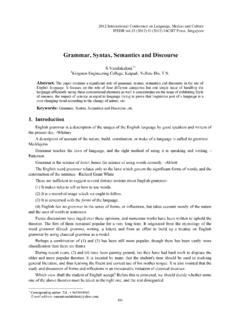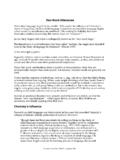Transcription of Discourse Studies and Education - Discourse in …
1 Discourse Studies and Education TEUN A. VAN DIJK University of Amsterdam 1. INTRODUCTION In this paper we will discuss the relevance of Discourse Studies in Education . By Discourse Studies we refer to the new interdisciplinary field between lingu-istics, poetics, psychology and the social sciences concerned with the systema-tic theory and analysis of discourses and their various contexts. This interdiscipline has developed as an extension from rather similar interests and problems in these respective disciplines. In linguistics, thus, it was ob-served that language use cannot properly be accounted for in terms of isolated sentences alone. In literary scholarship, always having been con-cerned with literary discourses, more explicit models for Discourse structures were required in order to assess specific literary or rhetorical structures in literature.
2 Psychology and artificial intelligence have recently also become interested in the processes underlying Discourse production and comprehension. Sociology has made a great contribution to the study of the structures and strategies of conversation in social interaction, whereas anthropology has a long tradition of Discourse analysis in the study of myths, folktales, riddles and other ritual or culture-specific Discourse types. Mass communication, finally, involves the important analysis of messages of the media and their influence on the public, a topic shared with social psychology, which is cru-cially paying attention to processes of belief-, opinion- and attitude-formation and change in communicative contexts.
3 These are certainly not all the disciplines involved in the study of Discourse : theology, psychotherapy, law Studies , etc. also have various kinds of discourses as their objects of inquiry. Our point is that the basic similarity between the objects, viz. forms of language use, Discourse and their communi-cative contexts, requires an interdisciplinary approach. Textual structures are in part very general, and so are the principles and processes of their production and reception in the communicative context. Moreover, in order to understand the specificity of various Discourse types as they are studied more exclusively in the disciplines mentioned above, a more general understanding of Discourse is necessary.
4 In this paper, then, we would like to discuss a number of points where such an interdisciplinary study of Discourse seems to be relevant in Education . We will limit ourselves to institutional Education in schools and universities. Intu-itively speaking, discourses play a primary role in Education : most of our learning material consists of texts: manuals, textbooks, instructions, class-room dialogue, etc. Therefore, we first of all should systematically analyze the structures of discourses used in Education : style, contents, complexity, etc. Secondly, it should be assessed how the various uses of such texts influence the processes of learning: the acquisition of knowledge, beliefs, opinions, atti-tudes, abilities, and other cognitive and emotional changes which are the goals of institutional Education .
5 Finally, the relationships between textual structures, textual processing and the structures of the socio-cultural contexts should be made explicit in such a study: different levels, types of Education , social background and cultural variation require different kinds of language use and communicational forms. In our brief survey of the textual aspects of Education , we will neglect the other interactional and communicative forms of institutional learning ( visual, manual, bodily, facial learning). Although we will assume that serious insight into the nature of texts and their contexts might provide some useful suggestions for applications in edu-cational practice in general, and in the study of language and communication at school and universities in particular, we do not want to claim that Discourse Studies will solve important social problems right away.
6 We would like to avoid the overly optimistic approach in this respect which charac-terized early generative-transformational and structural linguistics. We only state that since Education is predominantly textual more insight into the nature of textual structures and processes is a condition for a better under-standing of educational processes. On the other hand our approach should not only be theoretical or academic. If we know something more or less plausible about texts and learning, and if we have more or less particular conceptions about good educational practices and goals, our application should both try to suggest new ideas and methods and at the same time provide a well-founded and systematic criticism of the texts and dialogues which are current in actual Education .
7 This not only holds for the texts which are used, but also for the knowledge and insights taught about language and Discourse . Traditional schooling primarily has been focussing on grammar on the one hand and literature on the other hand. As if nothing in between, that is, all kinds of other Discourse types, language use and communication, should not also be used and analysed. Our paper will have three parts. First we will briefly summarize some basic results about the structures of Discourse , , as obtained in current text grammars. Secondly, we will show how these relate to work in cognitive psychology about reading, comprehension and memory of Discourse , and the processes of knowledge and opinion formation.
8 Thirdly, we will try to formu-late some consequences for educational texts, practices and goals. It should be stressed, though, that the latter points will be made from the perspective of a linguist interested in Education , not from the point of view of a professional educationist. 2. STRUCTURES OF Discourse Most linguists and most grammars, as we know, have been exclusively concerned with the analysis of isolated sentences. Especially in the last twenty years this study has made considerable progress by the application of systematic and formal models. Yet, both theoretically and especially empir-ically, this restriction to the sentence boundary has led to several important problems.
9 First of all, it appeared that many properties of the sentence, not only morphophonological and syntactical, but above all semantic and prag-matic, cannot be adequately accounted for without taking into account struc-tures of other sentences in the Discourse or conversation. Secondly, it was shown that sentence sequences have important linguistic characteristics of their own, such as connection, coherence, topics and changes of topics, turn taking systems in conversation, and so on. Thirdly, it was shown that language use should not only be accounted for in terms of sentences or even in terms of sentence sequences, but also in terms of more embracing units, namely texts or discourses as a whole.
10 And finally, several of the levels and dimensions of Discourse analysis do not properly belong to linguistics or grammar, but should be described in terms of theories of narra-tive, style, conversation, rhetoric, etc. In other words, a more adequate lingu-istic theory should pertain to sequential and textual structures of utterances, and should be connected with other theories which account for certain properties of Discourse and language use. Let us briefly enumerate some of the major results which have been obtained in these different kinds of linguistic and non-linguistic analyses of We thereby will ignore the extant linguistic insights into the structures of sentences.
